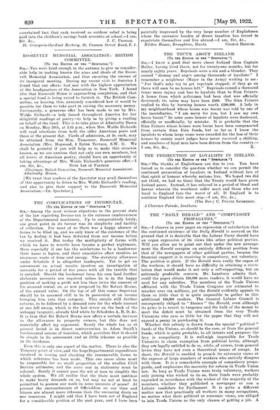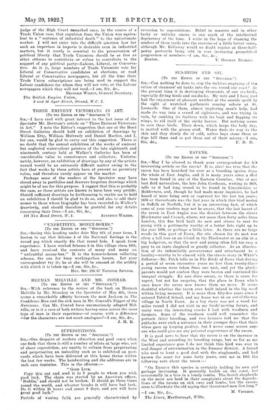THE "DAILY HERALD " AND " COMPULSORY PROPAGANDA."
[To THE EDITOR OP THE " SPECTATOR."] observe in your pages an expression of satisfaction that the continued existence of the Daily Herald is assured on the ground that it is desirable that the Labour Party should have an organ expressive of its views like other political parties. Will you allow me to point out that under the new arrange- ment the Herald occupies an entirely different position from that of the newspapers of other political parties, because the financial support it is receiving is compulsory, not voluntary. The position is plain. If the Herald were really the organ of the workers, it should have no difficulty in attaining a circu- lation that would make it not only a self-supporting, but an extremely profitable concern. Mr. Lansbury admits that, could the paper obtain 150,000 more readers, it would have no need for any subsidies. The members of the Trade Unions affiliated with the Trade Union Congress are estimated to number over six millions, yet the Herald evidently appeals to them so little that it is quite impossible to gather in this additional 150,000 readers. The General Labour Council is consequently obliged to " finance " the Herald, even although its price is to revert to twopence and the bulk of the money to meet the deficit must be obtained from the very Trade Unionists who care so little for the paper that they will not expend a penny in purchasing it.
Whether this subsidy is drawn from the special " political "
funds of the Unions, as should be the case, or from the general funds, which is quite probable, to all intents and purposes the levy is compulsory. It is well-nigh impossible for Trade Unionists to claim exemption from political levies, although they are legally entitled to do so, while, of course, from general levies they have not even a theoretical means of escape. In short, the Herald is enabled to preach its extremist views at the expense of large numbers of workers who entirely disagree with them. It is a remarkable example of compulsory propa- ganda, and emphasizes the necessity for reform in Trade Union law. So long as Trade Unions were truly voluntary, workers only joining who wished to do so, their funds were probably expended in accordance with the wishes of the majority of the members, whether they published a newspaper or ran a Labour candidate for Parliament. It is quite a different matter now that practically all workers in many occupations, no matter what their political or economic views, are obliged to join Trade Unions as the only chance of getting a job. A judge of the High Court remarked once, in the course of a Trade Union ease, that expulsion from the Union was equiva- lent to a " sentence of industrial death " to the unfortunate worker. I will not enter into the difficult question how far such an imperium in imperio is desirable even in industrial matters, but it surely is essential to the preservation of political liberty that Trade Unionists should be as free as other citizens to contribute or refuse to contribute to the support of any political party—Labour, Liberal, or Conserva- tive. As it is, large numbers of Trade Unionists vote for Liberal or Conservative candidates at elections, or read Liberal or Conservative newspapers, but all the time their Trade Union subscriptions are being used to support the Labour candidates for whom they will not vote, or the Labour newspapers which they will not read.—I am, Sir, &c., REGINALD WILSON, General Secretary.
The British Empire Union, 9 and 10 Agar Street, Strand, W.C. 2.



































 Previous page
Previous page